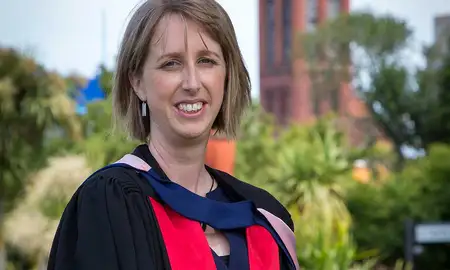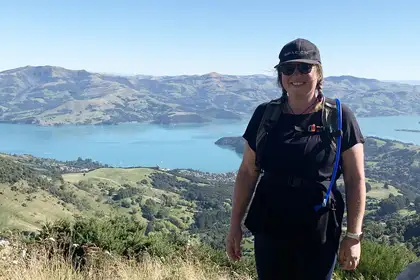
Racheal Priestley.
Her own experiences had shown her how challenging it was to navigate autism diagnoses, with three of her four children being on the spectrum.
“I was trying to work through the needs of my children as they were diagnosed and grew frustrated that I wasn’t being listened to, so I decided to find a way to be heard.”
In order to study while balancing being a mother, Racheal enrolled in a Bachelor of Social Work via distance and has now graduated with a Master of Social Work. She says she has found it satisfying on both a personal and professional level.
“I really love studying, it’s my ‘me time’ and offers a chance to escape into something else that has meaning. My motivation to gain these qualifications stems from wanting to be in a position where I can help others, but also for people to take notice of what I’m saying to get traction in support of my children.”
Rachael’s thesis, which focused on the wellbeing of mothers raising autistic children, offers both lived and professional research. It highlights a range of social issues stemming from a neo-liberal understanding of disability and support, which impacts the wellbeing of children and those looking after them.
“So many of the stories I heard from mothers during this research were incredibly similar, despite their unique family situations and experiences. The systems meant to offer support in managing a child with a disability are complex and often focus solely on the individual, while not accounting for the impacts on the whole family system.”
A lack of understanding and support is a leading cause in the negative impact on the wellbeing of mothers raising autistic children, exacerbated by the current shortage of caregivers.
“Caring fatigue is a real thing – imagine what it must feel like to have no end in sight for the demands of caring for everyone at home, and no opportunities to recharge. Not to mention the pushback when caregivers take a moment of respite, be it a massage or a manicure, and are made to feel selfish or guilty for it. These small things in our lives can make a difference and provide the opportunity to also be cared for. We need to care for our caregivers better.”
Her thesis has been accepted for publication in the Aotearoa New Zealand Social Work Journal. Racheal’s hope for this research is to see the wellbeing of caregivers prioritised, as well as to raise awareness around the experiences of those raising autistic children.
“It’s a tough and lonely road when you feel that no one understands, and there’s no end because autism is a lifelong condition. What I hope is for people to try and understand autism more, and really consider why a child may be behaving the way they are before jumping to conclusions about the choices a caregiver is making. If you know someone who is raising a child with autism, check in on them and offer them care.”
Racheal says taking on this research has been transformative for her.
“While asking mothers and caregivers how they care for themselves, I couldn’t help but consider this for myself. I’ve made significant changes to my lifestyle, including exercising two to three times a week, going hiking with friends and my children, and becoming mindful about taking breaks. I’m ensuring my wellbeing needs aren’t being neglected because I am trying to be it all to everyone else. If I can make these changes, I hope to encourage others to do the same.”
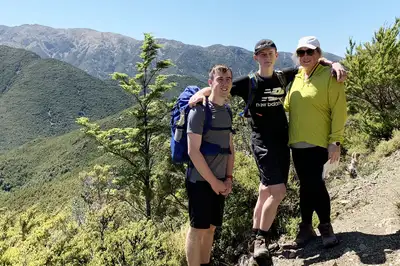
Racheal with her two oldest sons, Liam and Connor.
Considering herself a solution-focused practitioner, Racheal is looking forward to taking the next step by beginning her PhD study.
“I couldn’t end my academic journey on just identifying that a problem exists. I want to find out how we can support mothers and caregivers to do the amazing job of raising our children to reach their developmental potential, but not at the cost of themselves. If we can improve the wellbeing of our caregivers, then it’s going to positively impact those being cared for and their wider whānau too.”
Racheal is a Te Rau Puawai scholarship recipient and says this has been a key reason she’s been able to keep on with her studies.
“Te Rau Puawai offered so much support and a feeling of having a whānau behind you who believed in you. It helped me connect with some special people, like James who is one year ahead of me. He feels like my tuakana, we both whakapapa to Ngāpuhi, and he is always happy to share advice to help me keep on keeping on. I appreciate the time and support given, which really highlights the message of my research – that the key is having people who support you in a way that is helpful and meaningful.”
While there have been challenges, Racheal says she’s lucky to be surrounded by so many positive forces who have brought joy and love to her whānau.
“There are so many amazing people in our lives who have made a real difference, from teachers, our hospital team, behaviour support team, and caregivers who become part of the whānau. A professional can be the one person to give you the strength to pick yourself up and keep going. I hope those studying in this space at Massey strive to become that someone for a caregiver in the future.”
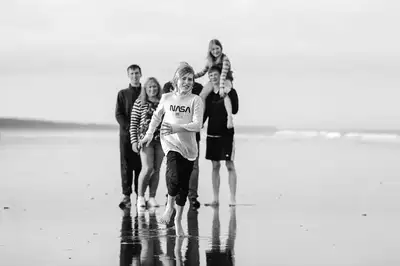
The Priestley family – Front: Harry. Back: Liam, Racheal, husband Aidan, Connor, and Sophie.
Related news
“Worth every late night and every tear”
Growing up on Waiheke Island and being the only teen pregnancy there at the age of 16, Sam Davis, Ngāpuhi, Ngāti Kahu ki Whangaroa, Ngāti Kauwhata, Ngāti Raukawa, chose to study social work after seeing first-hand the impacts it can have on whānau.
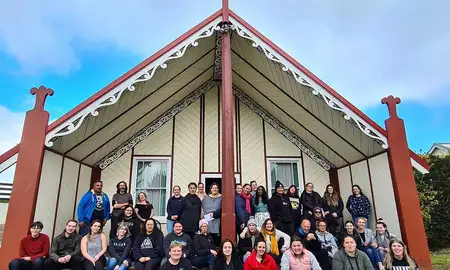
Call for social work to be 'decolonised'
A Massey University researcher is calling for social work education in Aotearoa New Zealand to be decolonised. Social work lecturer Dr Paulè Ruwhiu, Ngā Ngāti Porou, has just completed her PhD research into the process of decolonisation and the experiences of Māori social workers and Māori social work students.
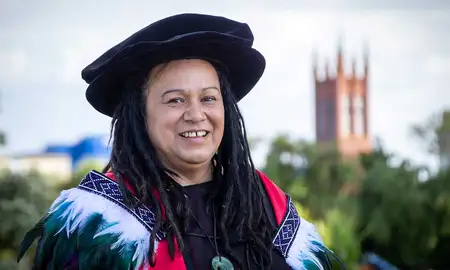
Parenting a child with autism and the power of hope
How others perceive and react to children with autistic spectrum disorders (ASD) can impact parents dealing with their child's difficulties. But new research says despite feeling judged or misunderstood, parents can develop new strengths from the challenges.
